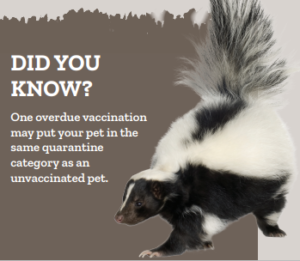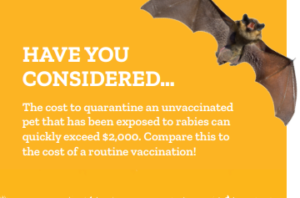Rabies – Protecting You and Your Pets
Rabies is becoming more common in wildlife along the Front Range, putting humans and animals at risk for this deadly disease. In Colorado, most rabies is found in skunks and bats. Raccoons, foxes and coyotes can also be carriers for rabies.
What is rabies?
Rabies is a disease caused by a virus that attacks the nervous system. It is usually transmitted to people and animals by a bite from an infected animal that has rabies in its saliva.
Who can get rabies?
- All mammals, including humans and domestic pets/companion animals, can contract rabies. Most cases in the United States are found in wildlife such as bats, skunks, raccoons, foxes and coyotes.
- Humans can contract the rabies virus if exposed to an infected animal.
- Dogs are still a significant source of rabies in other countries, so people should be aware of this risk when traveling outside of the U.S.
- People in high-risk professions, such as wildlife rehabilitators, veterinarians and animal control officers can receive pre-exposure vaccinations to protect themselves against the virus.
How dangerous is rabies?
Once the clinical signs of rabies appear, the disease is nearly always fatal – resulting in death for both animals and humans who have contracted it. There is no cure for rabies.
How can I protect myself and pets against rabies?
- Rabies can be prevented – and vaccines can protect your pets!
- Vaccination is the most effective way to prevent the spread of rabies. Boulder County law requires dogs and cats older than three months of age to have current vaccinations against rabies.
- Vaccinations must be repeated, as necessary, throughout your pet’s life.
- Contact your veterinarian if your pet is exposed to a wild animal, especially if that wild animal is acting unusual, sick or dying/dead.
- Unlike humans, animals cannot be treated with preventative injections after they are exposed. This is why it is so important to always keep your pets up-to-date on their vaccines!
What if my pet is bitten?
- Even if your pet has a current rabies vaccination, you should report the bite to animal control immediately.
- Have your pet vaccinated against rabies at your veterinary clinic, and speak to the doctor about your pet’s re-vaccination timeline.
- Pets with expired vaccinations will be evaluated on a case-by-case basis.
- Pets that have never been vaccinated against rabies and are exposed to a rabid animal must either be euthanized or placed on a strict quarantine for six months.
What if I am bitten?
- If you are bitten by an animal – don’t panic. Contact your physician and local health department immediately to report the bite.
- You may need a series of vaccines to protect against rabies.
- If possible, and safe to do so, confine the animal.
- Do not release or dispose of a wild animal. Contact your local animal control office for immediate help.
What if my pet bites someone?
- Report the bite to your local animal control office.
- Your pet will be placed on an observation period. During this time, you should monitor and report any illness or unusual behavior by your pet.

Other rabies prevention tips:
- Never catch, handle or try to pet a bat.
- If your pet catches a bat, or one is found indoors with your pet, contact your local animal control office.
- If you are bitten or scratched by a bat, contact your local health department immediately.
- Skunks are attracted to food and ground-level shelters such as home foundations and raised porches. Block access to these places and items to help keep skunks away from your home and pets.
- Never feed wildlife or attempt to scare them away with your bare hands.
Local Boulder rabies resources:
Download our full-color brochure: Rabies: Protecting You and Your Pets.
